Rants
You Might Not Like AI Art, But It’s Here To Stay
by John Walker on Dec.14, 2022, under Rants

The word “Luddite” has unfairly pejorative connotations in the modern age. In the early 19th century, English textile workers saw where their industry was heading with the introduction of technology, and recognised the imminent destruction of their livelihoods. So, in response, the workers would protest the new factories, and famously, destroy the rival machines.
It was hopeless. Such protesters were shot by the factory owners, and eventually the British army was used to suppress their wider movement. And, inevitably, machines became the primary way to create textiles, as is still the case today. The Luddites were not—as they are so often parodied—afraid to embrace modern technology. Instead, they were simply aware that it would starve their families. They were trying to defend their livelihoods, protect their loved ones, and responded with physical violence against capitalist violence.
This is all to say, I entirely get why artists are so furious about AI art creation. This new technology has the real potential to—at the very least—carve into a craft that has existed for thousands of years. If a book cover or movie poster or piece of background art can be created by typing a sentence into a website, then of course artists who’ve trained their whole lives to be masters of their craft are going to lose work. It must be terrifying, not least with the speed with which such extraordinarily powerful AI has appeared in the last year. I hate that very rich corporations, that absolutely could and should be compensating those from which they are gaining, are not.
I’m also aware that if AI can start doing as good a job as, or even better than, conventional artists, then it will win. Because every example of technology replacing artisan skill in the last few hundred years has ended that way. The protesting, the fury, and the sense of unfairness, will have no bearing on anything, and the computers will win out. This isn’t pessimism, and nor is it “giving up”; it’s just simply understanding reality.

I don’t have a solution, because I don’t think there is one. Much as the Luddites hopelessly smashed apart that which would replace them, it’s completely understandable that current artists wish to find a way to smash apart this latest technology. However, it’s even more futile a task in the digital age, and attempting to find methods to do so is going to be very ugly, and very self-defeating.
This is already demonstrably the case in the current main messaging against AI art: It is, we’re endlessly told, “theft.” As someone who has been a loud voice for the last twenty years within the (mostly hopeless) movement to prevent corporations from tricking the wider public into thinking that copying is theft, this couldn’t be a more demoralising position to see taken by the creatives themselves. Copying isn’t theft, it never has been, and it never can be. This isn’t a moral argument in favour of copying, it’s a factual argument about what words mean. Theft requires the original item to no longer be in the original owner’s possession, and no matter how many knots people try to tie themselves in, that can never, ever be applied to copying. Indeed, you wouldn’t steal a car. But you’d sure as hell download one. Call it bad, fight against it, but don’t call it something it isn’t.
It’s genuinely bewildering to have lived through the Napster years, when suddenly the world realized that music had at last been freed from its one-hundred-year-long plastic prison (and during which time official album sales spiked worldwide, and record labels never made more money, until they had Napster shut down and sales started falling again), where people were threatened by corporate goons out of their life savings because their grandkid downloaded a Sum 41 album, to then see the creators of art attempting to use “theft” as their attack against corporate AI.
Copying may be something you’re against! You may wish to legislate against copying. Rather famously, there’s that whole “copyright” system, that itself has been brutally twisted into a weapon of oppression rather than a tool of freedom. But it isn’t theft, it isn’t “stealing,” and I am aghast at the decades-long backward step at seeing this being wheeled out by the “goodies,” in an attempt to fight the “baddie” corporations.
Should artists be compensated for their creations? Of course, if their creations are desired. I am a passionate believer in the patron system, where artistic work is paid for at the point of creation, and I believe that credit should always be given to those who have created something. I also passionately believe in sharing, and am vehemently against systems where a creator is paid in perpetuity for work completed years previously. I don’t feel beholden to the estate of Monet or to whichever current painter if I fancy printing off one of their paintings, any more than I think I should pay the plumber who fixed my tap every time I use the sink. I get paid for my time when writing articles about games, not whenever anyone reads them in five years’ time. (And should a time come when AI can usefully critique artistic creations like games, then yes, I’ll be screwed too.)
Yes, AI systems are fed with potentially millions of pieces of art, from which its code learns the patterns, systems, techniques, styles, and then attempts to reconfigure them into something original. And yes, they are mostly doing this with no permissions from the creators of the pieces of art that go in. But here’s the bad news: that was just a very accurate description of all of art ever.
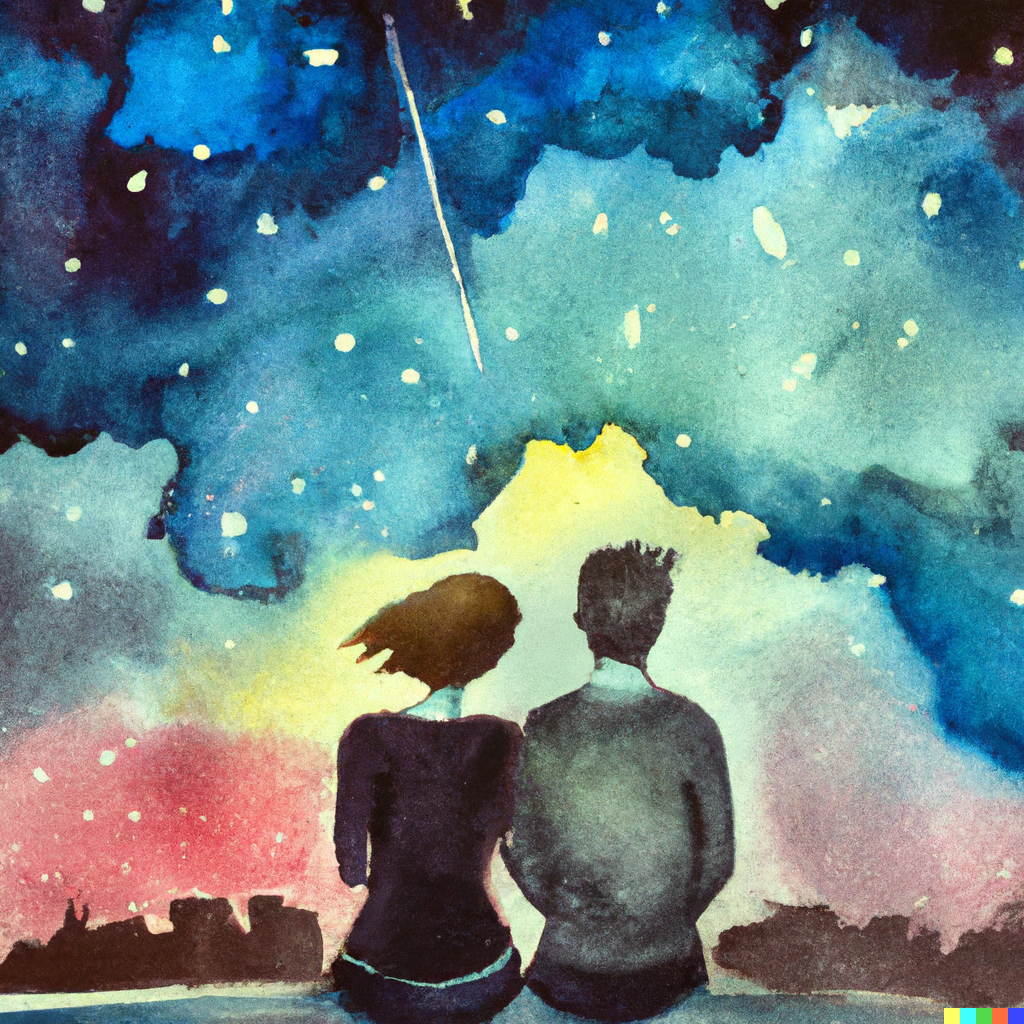
No artist creates art in a vacuum. Since the first cave person scrawled in mushed up flowers on a cave wall, all art has been formed based on what has come before. All artists, since the beginning of recorded history, have learned art by copying other art. None needed to ask for permission—hell, for a good period of history, they were actively encouraged by the original artists. The most famous artists you know, especially those known for pioneering new movements, began by learning the patterns, systems, techniques and styles of those who came before, and then attempted to reconfigure them into something original. Picasso was one hell of a realistic portrait artist, as taught by his father, before he ever explored Cubism.
Computers didn’t think up AI art generation on their own. It was programmed by people, whether for good or evil. This isn’t a robot takeover—it’s new man-made technology doing as good a job as human creators. And as soon as we started “feeding AI a thousand…” of whatever, to see what it would generate, this became inevitable. You can hate it, and you can hate the corporations that have been quick to take advantage of it, but trying to redefine it as something more evil than the printing press or the self-scanning cashier machine in the grocery store is folly.
(I want to clarify something here, that I fear would otherwise be misunderstood: I am not advocating for people to directly use an artist’s previous creations for their own financial gain. I believe, obviously, an artist should be compensated in such a circumstance, unless that creation has been graciously released under a copyleft license that allows such use. However, I do believe that any piece of art is a legitimate source for inspiration, and being inspired by any piece of art when creating one’s own, even for financial gain, is clearly legitimate, given—again—all of history.)
In the latest of Luke’s passionate tirades against this technology on Kotaku, he firmly states “machines don’t make art. They’re machines!” This is, in my opinion, utterly wrong. Because as anyone who’s had to suffer through any interminable “are computer games art?” article will know, art is in the eye of the viewer. I’ve typed in sentences to AI art creation software that has produced images that are utterly beautiful. Of course it’s art, no matter how much I might not like that the tool that created it is owned by a corporation that sees no desire to compensate those from which it has gained.
I think there’s a very uncomfortable uncanny feeling about AI art, but I think it’s because it is art. There’s a piece of soul in it, but it’s not earned. It’s likely the scraps of soul that survive the mechanical processing of what’s been fed in. That’s existentially unsettling.
I hate it a bit, too. I mean, I can draw to some degree. I’ve been paid to draw silly cartoons for things over the years. I’ve sold them on greetings cards. Now, you can create something just about the same by asking Dall-E for a “cartoon of a rabbit in a medieval helmet.” Mine’s on the left, Dall-E’s is on the right:
Like all other artisan crafts where technology has allowed the mass production of very similar creations, I know that we will see AI creations replace a large amount of what would have been commissioned to artists. I also hope that many will recognize the worth of commissioning a person to use their skills to create something utterly bespoke, specifically for your needs.
I’m also aware that I can’t wait for AI to replace the current gouging of corporations like Getty and Shutterstock, who try to charge hundreds or thousands of dollars for copying an infinitely duplicable jpeg. Sure, they’ll all try to figure out how they can monetise it for a bit, before such technology escapes their confines, but it won’t last long.
Yes, many will be utterly furious with me for writing any of this, no matter how clear I make it that I would prefer for artists to be compensated, and for original work to be commissioned. But I won’t allow myself to deny two core truths, no matter how little I might like them: Technology always successfully replaces the mass production of artisan craft, and fighting to prevent it is a depressingly futile act that hurts the creators whose livelihoods are being threatened. As awful as any of this might be, it doesn’t change reality.
Artists and creators should not be fighting this with the language of greedy corporations, with attempts to wield corrupt systems like “copyright” and “intellectual property,” making ridiculous claims of “stealing,” but instead by proudly standing up and showing why what they create is special. Artists should boast of their talent, loudly display their work, seek patronage, and work together to create systems that better put themselves in front of people.
You—you—should respond to this by being diligent in your beliefs. Fund artists. Find their Patreons and sign up. Scream at sites like ArtStation until they add a button that lets you financially support artists you admire. Pay for art you care about. That’s a damn site more effective than screaming in fury at technology for existing. It’s going to win. You can’t smash it up, and the people who own it have the bigger guns.
How To Use AdBlock Nicely
by John Walker on Aug.20, 2015, under Rants

AdBlock is a useful tool. There are websites that are close to unusable, or even entirely broken, because of their advertising. There are sites that use dirty, underhanded tactics like pop-unders. While clearly the best argument is to say that perhaps one should just not visit such websites at all, it’s obvious that people are going to use AdBlock instead. Denying it is silly. However, by default, AdBlock removes advertising from every site you visit with that browser, no matter how relevant, responsible or reasonable. And when ads don’t load on websites, those sites don’t get money. This means they either eventually wither and die due to lack of funds, or they resort to even more intrusive, gross, unblockable advertising, like paid advertorial disguised as genuine articles, or hollow pieces written purely to stuff with affiliate links. As much as you may not revel in seeing a Taboola list of The Amazing Tricks Insurance Companies Don’t Want You To Know, those sites are only there for you to read because those ads are there too.
Default AdBlock causes you to become a smash-and-grab user of the internet. You may be Googling to work out why your boiler isn’t working, find the solution on a super-helpful website you’ll never visit again, and then get on with your hot watery day. But that super-helpful website got nothing from you in return, because the ads they depend on didn’t load. And the couple of banner ads that would have appeared would have made no difference to you at all.
But there is a way to use AdBlock entirely differently, that’s very simple to set up. Instead of blacklisting the entire internet, and perhaps whitelisting (allowing ads on) sites you may one day remember to try to support, you can whitelist the whole web, and blacklist those that offend. Like this:
1) Click on the Adblock logo, and pick “Options”.
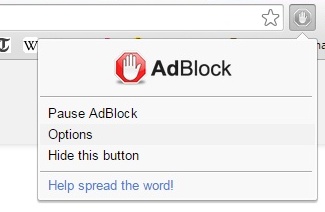
2) Select “Customize” from the top row, and then click on “Show ads everywhere except for these domains”.
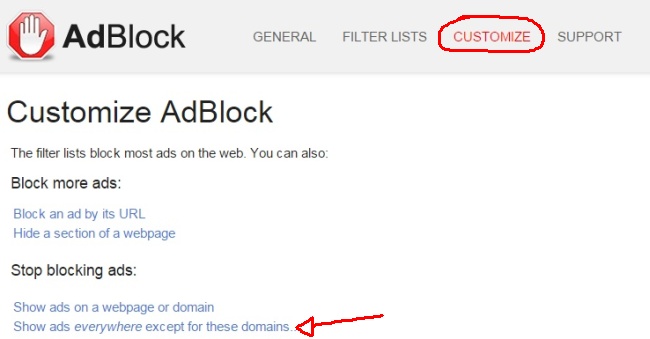
3) In the options that appear, add at least one website (without the ‘http://’ and the ‘/’ at the end), and then click “OK!”
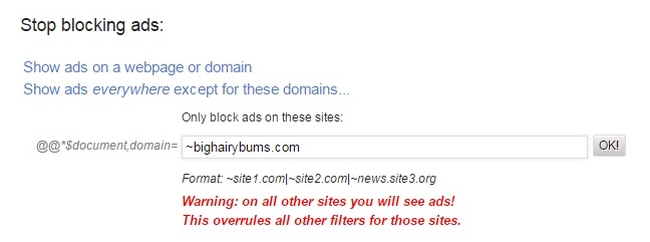
And you’re done!
Now the whole web is whitelisted apart from that dreadful BigHairyBums.com site with its pop-under auto-playing video ads for hitmen and poison. Although, once again, perhaps consider whether you want to just not visit the website at all. If you want to blacklist something else, you just click on the AdBlock button and choose “Enable AdBlock on this page” to automatically add it to the list.
You’re a much fairer user of the internet now. And you’re helping sites you enjoy, or even sites you flitter past, to stay online.
Jurassic World: A Review
by John Walker on Jun.11, 2015, under Rants, The Rest
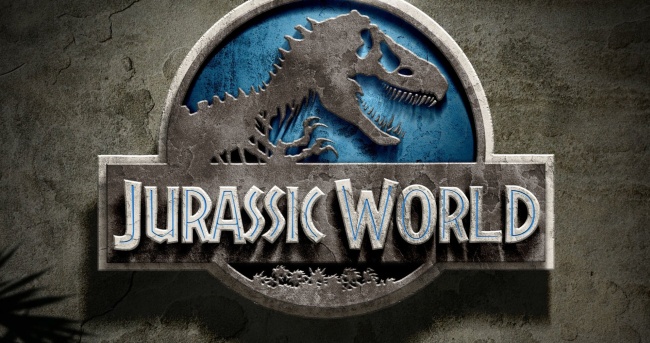
Jurassic World is a truly horrible film. Not simply because it’s badly written, drearily directed, and horribly acted, although it is all those things. But because it’s a joyless void.
Spielberg’s Jurassic Park is a splendidly fun movie, for all manner of reasons, but key is that it understands one huge thing: dinosaurs are amazing. Jurassic World begins with the premise that no they’re not, that they’re boring, and that we’re all over them. And sinks deeper into its awe-free mire from there.
The park is open, successful, and packed with tens of thousands of visitors. But, we’re told in the opening breath of the movie, people are over dinosaurs now. They’ve seen them, they’re used to them, they need to create something bigger, scarier, more powerful. In some ways it’s a defiant opening statement for the film to make: we’re going to be so much more than that 22 year old movie (no, it’s really 22 years). It’s a statement that its audience is au fait with dinosaur movies, even bored of them. So you just wait folks, we’ll make something even better.
But huh? When did we stop loving dinosaurs? When did we get cynical about seeing them at the movies? That’s not something anyone’s ever expressed. In fact, the reason people were delighted to hear the franchise was back is because it’s been so long since a film revelled in their majesty. Fourteen years since the entirely forgettable Jurassic Park III came out. Eighteen since Spielberg was at the helm. Sure, we see dragons and magical monsters in every other film, but that extraordinary, breath-taking wonder that was felt the first time you saw the family at the foot of a brontosaurus? The rush of watching the gallimimuses “flocking this way”? The utter terror of the velociraptors in the kitchens? Imagine that, but with 2015’s technology! Imagine the wonder!
Jurassic World is a film with the wonder surgically removed. Every character but for the generic impish child is utterly uninterested. It shows little children bored as they ride around on baby triceratops in petting zoos, parents staring into the middle distance. It’s probably a statement about how we’re all staring at our phones as the world goes by around us, or something. But in a film so empty-headed and blunderingly constructed, such social commentary is wholly out of place. This is a film with open contempt for its audience, snootily condescending of the imagined demand for bigger, scarier dinosaurs. And then is about a bigger, scarier dinosaur, that has apparently had its DNA spliced with nearly every other species of animal on the planet.
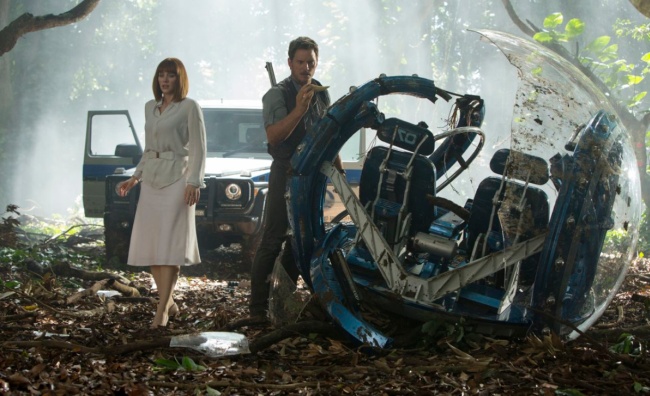
The plot is so dumb it feels like lying when trying to explain it. They’ve made this super-dinosaur, bred it to be larger, scarier, more exciting than a T-rex for the jaded fools it imagines are watching, and then almost instantly releases it into the island. But there’s also these velociraptors that Chris Pratt has sort of tamed a bit, and there’s this baddie man who wants to use trained velociraptors in the army… oh God, seriously, this is the story. Meanwhile, two children are posted to the island by their mom, Judy Greer, to spend time with her sister, Aunt Bryce Dallas Howard. Aunt Bryce is IN CHARGE OF RUNNING THE PARK, but Mommy Greer is utterly bemused that she’s not able to drop everything and entertain her children for her for a couple of days. How dare she?! But then wouldn’t you know it, just as things start to go wrong, it’s those two boys alone who are inexplicably in immediate danger. It then slides downhill until the finale that defies all credibility.
What unfurls is drowsily stupid. At no point does anyone make a decision that makes any sense. “Keep everyone trapped on the island with the killer dinosaur, because if we send them home we’ll be closed down!” That’s literally the argument made by one character. And every single moment of peril is caused by people being too hideously brainless to ever just go indoors. No dialogue is worthwhile – there’s not a single line in the entire film that works properly. Jokes repeatedly and awkwardly fall hideously flat, met with complete silence in a packed cinema. Even a conversation between two dinosaurs – no, I wish I were kidding – is over-long and boring.
However, the cynical nastiness of the film is a lot more deeply rooted than just in its sneering plot. It also seems to believe that it needs to be incessantly gruesome to keep us thrilled. Except, it goes so far that any 12 year old watching would experience a few sudden moments of really unpleasant trauma, between extended periods of yawning and asking if it’s over yet. Spielberg expressed dismay at how kids had been upset by a couple of moments in the original Jurassic Park. Jurassic World seems desperate to ensure everyone feels uncomfortable. Spielberg had Martin Ferrero get eaten on the toilet, and Wayne Knight scoffed in a car. Jurassic World slaughters in dozens, with scenes where the dinosaurs extensively torture established, benign characters, before tearing them into pieces. It kills and kills and kills, blood splattering, everyone dying with anguished screams in complete terror. It’s miserable.
When the film ended, I felt a moment of genuine surprise when the director’s name came up. I thought, “Why would you deliberately own up to that?” It’s a film that seemed to hate its own existence, and its audience for wanting to see it. And despite the frenzy of deaths, the ever-so-slightly bigger than a T-rex baddysaurus, and the far greater technical capability, it feels a far smaller film than Spielberg’s original. There’s no sense of scale, no presence, no excitement.

At one point, early on, there’s a moment of wit. In an arena designed to look like the whale show at an aquarium, a monstrous aquatic dinosaur is shown off, leaping out of the water to catch its food, then splashing down and soaking the audience. The food being dangled is a great white shark. It feels like a statement, a bold claim that this will be a disaster film that nonchalantly eats Jaws for breakfast. It proves to be a pivotal moment of arrogance from which it can never recover. (And not least because the clunking rigid rubber head of a dying brontosaurus is less convincing than that ’70s robo-shark.)
Oh, there’s so much more to rant about, so many more abandoned sub-plots, utterly irrelevant characters given extraordinary amounts of screen time… but none of it needs saying after the most key problem: it’s a film that’s bored of dinosaurs. Who the hell is bored of dinosaurs?
The British Press Isn’t Much Fun
by John Walker on Sep.16, 2014, under Rants
I genuinely don’t understand the motive of the British press’s front page coverage of the tragic death of a couple of British backpackers in Thailand. I don’t compile this to prove any point, or even know whose point it would prove. I just find the phenomenon deeply peculiar. A man and a woman have been killed, but apparently one seems to be of more interest than the other.
You Probably Aren’t Reading The Original Post
by John Walker on Jun.25, 2014, under Rants
I’ve deleted this.
I stated at the top of the piece that it was a deliberately one-sided argument, a counter to an ongoing topic I’ve seen come up over the years, and made emphatically clear that things about it would be wrong. But this is not a possible way to go about things, it turns out. A large part of the reaction has been incredibly inappropriate, with people interpreting an argument that contained,
“And I am quite certain that some brilliant writers are not receiving the consideration they deserve because of their sex, sexual identity or nationality. There are boys’ clubs in this business, and this business is a massive majority of white men. Hello. The lack of diversity in the coverage is a significant problem, and is most clearly revealed in the tacit or overt tolerance for the worst tropes of the games themselves. It’s a mess.”
as one that was arguing that there were no such problems, or even that I was deliberately attempting to oppress people. That’s insane, and not something worth trying to deal with. I know it’s a lie, and the people close to and important to me know it’s a lie. But it remains a terrible lie.
It’s been pointed out to me that my article, on a different day, might have been received differently, but right now a few people are hurting too much for it to be a useful contribution. This may well be the case. I haven’t engaged with that side of things, presumably I don’t follow the relevant people on Twitter and missed it. I was capturing thoughts I’ve had for a long time, and wasn’t responding to any individual. But if it just caused more hurt, then it wasn’t useful either. I likely wandered into a discussion I don’t know about, and looked like I was directly attacking specific people. I wasn’t, and I apologise to anyone who was hurt by it.
I have worked so hard to fight for the rights of freelancers, both when I was one, and since I’ve been in a position to employ them. I vociferously campaign against companies that are exploiting freelancers by not paying them. I am proud of what I’ve done. Since what I wrote was either so faulty and poorly communicated, or so wilfully misinterpreted, to suggest the opposite, I can see no good in leaving it up. Thank you to everyone who understood what I was saying, and thank you to those who engaged with where the argument was wrong and provided excellent replies. The comments are still below.
On UKIP, Ignorance, And The Lazy Lie Of “Disillusionment”
by John Walker on May.27, 2014, under Rants, The Rest
Disillusionment is so often cited as the reason people vote for extremists, the underpinning reason why X or Y is happening in British politics. And it’s mostly gibberish. It’s a nonsense told both by those who wish to vote for extremes, and by those attempting to justify why others might vote for those extremes. The reality is, it’s barely ever the case.
I feel like we’re in a pretty scary place. When it comes to politics, there’s obviously a tendency for hyperbole, exaggerating one’s claims to suit one’s political agenda. But for someone with left-wing beliefs, their understanding of how to treat others best represented by socialism, the United Kingdom is currently a frightening political landscape.
People are voting UKIP/BNP/English Democracts, etc, etc, we’re told, because they’re disillusioned with the main parties and want to see things shaken up. This is plain, absolute rubbish. It doesn’t make sense in any way, and the media’s frequent declaration that this is the case is both intellectual snobbery, and woeful naivety.
The obvious reality is, a large contingent of people voting for extremes, for racist and homophobic parties like UKIP, BNP, etc, do so because they are racist and homophobic. Pretending this isn’t the case is endemic in the reporting of our politics, perhaps from a fear of appearing “biased”, perhaps from a fear of alienating the racist and homophobic contingent of their audience. Very few people tend to wear the mantle of “racist” with pride, hence that most oxymoronic of aphorisms, “I’m not racist, but…” The inevitable continuation of something either grotesquely or insidiously racist rather confirms the contrary, but for some reason our press has opted to acculturate itself to the opening gambit. Essentially, the coverage of UKIP in the recent elections has been, “UKIP isn’t racist, but…” The reality of course being: UKIP is racist, and lots of people who agree with their racist views have voted for them accordingly.
You & Yours And Its Gloriously Failed Attempt To Promote Audiophile Woo
by John Walker on Mar.06, 2014, under Rants, The Rest
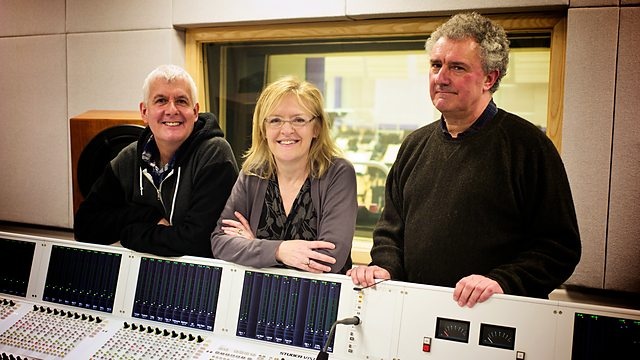
Oh glorious day!
One of my favourite worst things is BBC Radio 4’s You & Yours. On when I get my lunch, each weekday I get to hear a portion of this most daft of consumer shows, as they spread fear and concern about whatever was in yesterday’s Daily Mail. That’s not to say they don’t sometimes do some good – I believe they were pivotal in ending the banking scam over taking five days to process cheques, and they often do a good job of airing scams to make people aware of what to avoid. But this is always scattered with main host Winifred Robinson’s scaremongering and personal vendettas, as she ceaselessly attempts to campaign against things she’s been proven wrong about, most recently her deranged fury about DAB radio.
Today though, something wonderful happened. The end of the episode featured a segment in which two music engineers came on to explain about the wonders of “high resolution music”. This, we were told by straight faces, was the same as increasing the pixel count of a picture, enabling more detail to be heard. Incredibly at one point one of them acknowledges that previous recording qualities already matched what the human ear could detect, but no no! Despite this, the “harmonics” were more clear if there was a new way to have to buy lots more expensive equipment!
I’m not a sound engineer, and I’ve no idea if there’s genuinely any measurable improvement in the quality of the recording, but I certainly do know that no human would be able to tell.
As they were given air time on this national radio station to make their ridiculous claims entirely unchallenged, unquestioned, and only excitedly enthused about, they played in clips of recordings in “low res” and “high res”, so these experts could explain the difference. And it was pure woo bullshit from start to finish. Brilliantly they made it clear that no one listening would be able to tell any difference between the two because radio waves would take the magics away. But then played them anyway. They would be able to tell, in the studio, listening on a “high definition Sony Walkman” through their £90 billion headphones. They played Ella Fitzgerald twice, explaining which was low and which was high. Winifred declared she could “almost” hear Ella’s breathing on the second, opening the door for some wonderfully silly explanations about the guests’ surprise at how noticeable it was, how it was a “mellower, warmer sound” and “more dynamic”. “It actually started off slightly quieter,” the second expert explains, “and that’s one of the great things of higher resolution, whereas a CD if you like levels it out a bit just by the nature of the delivery, so you’re right, I think it was more noticeable than I thought, and I think we are losing dynamics on a lot of CDs.”
Low Carb Diet Tips! Delicious Alternatives To Those Carby Treats
by John Walker on Jan.27, 2014, under Rants

Are you on a low carb diet? Whether you’re keto, paleo or cavemanning, there’s a good chance you’re craving some cakes, begging for bread, or pining for a pie. Fortunately, there are many delicious low-carb alternatives to all the most tempting treats, and we’ve compiled a the best of them here for you. Read on to find out how you can stick to the diet, while keeping away from flour and sugar!
1) Tortilla Wraps
Remember when tortilla felt like it was a healthy choice, rather than a great chunk of bread? Well, nope, it’s just as packed with the carbs, if not worse! But thankfully there’s a superb way to enjoy your chicken salad in a wrap without turning to flour: lettuce! All you need to do is take a nice big lettuce leaf, pop your sandwich fillings in that, roll it up, and then stare at it on the plate. Just stare, keep staring. Don’t look away! The longer you stare, the more awful everything starts to feel, until eventually you stuff the green, crunchy mess into your mouth in an attempt to make the darkness go away.
2) Those Pub Pies
If you’re like me, one of the toughest aspects of paleo living is losing out on those succulent, tasty pub lunch pies. That gorgeous crust, the combination of pastry and filling – what a thing it is. But what a lot of carbs it is, too! Instead, as a light-weight healthy alternative, why not try sitting in a corner and crying?
3) Pizza!
One of the ultimate comfort foods, pizza has for so long been that Friday night treat, delivered to your front door and gobbled up by all in sight. But that doughy base wouldn’t have been on any cave man’s menu, so it can’t be on ours. But do not fear! There are fantastic pizza substitutes. Why not try taking a circle of cardboard, and then drawing a pizza onto it. Chow on that, until eventually the craving or will goes away.
4) Baked potatoes
Sure, it may seem like a cruel joke when the thing everyone told you was a healthy choice for lunch turns out not to be bloody okay either. But the paleo pantry has much to offer in its place. What about having some more cauliflower instead? Sure, you’ve only eaten cauliflower for the last seventeen meals, but why not have some more again, now, instead of everything nice or fun? This time, why don’t you bake the cauliflower, because you would bake a potato, and perhaps there’s some sort of toxin in cauliflower where if you eat enough of it eventually it causes delusions and the manner in which you cook something will be enough to trick your starving brain into believing it’s some food you actually wanted to eat.
5) Fish and chips
Certainly not appearing in any diet, fish and chips is Britain’s national dish, adored by content people everywhere. They may well feel guilty for all the oil it’s cooked in, but we know better! It’s the flour and the potato about which they should feel unending shame. So here’s a neat tip for your keto supper replacement: oil! Not olive oil, apparently, or any of the oils you can actually buy in shops, because they’re probably made of bread or something. But oils no one has ever heard of before, that can only be bought in specialist shops that exist only during thunderstorms. Oils like elderberry oil, broccoli oil and cheese oil. Just have some of that, in a bowl. With butter.
6) Happiness
We all see the smiles on the faces of people coming out of Subway, or polishing off a bag of crisps outside the service station doors. We want to remember what that was like – to smile, to experience positive feelings. But fortunately there’s a great keto equivalent: despondency. While it may not appear to be quite the same as happiness, it contains 90% fewer carbs to be disappointed, and weeping discards plenty of the body’s unwanted sugars. Sure, your thin friends all eating their cornish pasties and drinking absolutely any form of alcohol that isn’t neat ethanol seem like they’re having a good time, because they are.
5 Reasons Cracked.com Is About To Kill Your Family
by John Walker on Dec.11, 2013, under Rants
No one loves making things up more than lazy people, and therefore something something people think Cracked is staffed by murderers and Nazi robots. Well, I’m here to tell you, based on things I’m writing at the moment, that those people might be more right than anyone realises.
I’ve written for a website, as a writer, poster, editor, deleter, scheduler and writer. My work hasn’t won a Games Media Award, but I’ve been around the block, and I can’t help but notice that these days you can’t browse forums about Cracked.com without pretending you’re reading about how they all time-travelled from the Crusades, the blood of Muslims still on their tunics, to write propaganda for North Korea.
So are we heading for an explosion? Short answer, yes. Long answer? Yeeeeeeeeeeeeeeeeesssssssssssssssssss.
#5. They Kill Pandas For The Noise It Makes

Not to stereotype here, but we can safely assume that everyone at Cracked.com just adores the sound it makes when a bullet or blade slices through the flesh of a panda. It’s not the sport, the challenge, just purely the aural pleasure it brings them as they steal the life from those beautiful creatures. The younger the better, too, with Cracked staff often found crouched outside of zoos where reports of a panda birth have reached them.
#4. The Management Have Gone Insane, And That’s Making Editing Impossible

Let’s say you’re putting on a child’s birthday party, for some reason. Maybe you have a child you love. Well, you can probably be sure that the management staff of Cracked will turn up, chainsaws circling above their heads, as they scream something about how the Dark Lord Morbidor instructs that all innocent life must perish. And to fund this, the budgets at Cracked are out of control. One article on Cracked might have cost upward of EIGHTY TWENTY HUNDRED THOUSAND MILLION DOLLARS. And these costs are stifling all other articles on the site, and indeed on the whole of the internet, as all hastily written bitter rants have to compete with these figures. Even those on a blog written by some guy in his spare room, for some reason. And then there are those guys writing on their blog in their spare room, who can do it for cheap, and how is Cracked.com supposed to compete with them? By spending a millionty more money of course! This all makes sense, and someone’s got to fuel those chainsaws.
#3. Cracked Articles Are Written By Chinese Slave Children In Manacles

Although I’ve never written a Cracked article, nor ever been to their office, I can speak with some authority when it comes to the way their articles are written. Generally a Cracked editor gets driven to the offices, for free, in a platinum-coated Mercedes, where he’s carried aloft the shoulders of Filipino boys, and taken to a room built of gold and caviare. Here he is given wads of banknotes and golden jewellery, while maiden nymphs fan him with rose-scented palm fronds. As he is fed with truffles and cake, an unseen army of enslaved Chinese children are forced to type up pithy lists of search-result-catching topics. Should they not be sardonic enough, the children are beaten to death. Of course, you’ll see people writing positively about Cracked articles – that’s no surprise when every dollar bill in America contains Masonic iconography, depicting the faked moon landings in Dallas, 1963. Why else do you think 9/11 happened to happen on a Tuesday?
#2. You’re Always Buying Flan

Every human being alive has seen an Outbrain link to a Cracked article promising the funniest subject imaginable, only to have the article contain two decent ideas awkwardly dragged out to six or seven parts. You may ask yourself why they’re allowed to get away with that – isn’t it false advertising? Or fraud? Well, SEVENTY FOOT TALL KILLER CYBORGS FROM SPACE.
In the world of writing for Cracked, octopuses control the oceans, bending the watery reality to their will, forcing all other lifeforms to ladder breakdown particle hyphen topography. They’re killing us. They’re all killing us. They’re controlling our minds, making us do what they say. Can’t you see? Can’t you see that everything is a lie, and we’re their puppets? They own us, they make the decisions that decide our daily lives. Everything they write is a trick, and they’re unravelling the internet!
#1. Cracked Writers Are Monsters And They Eat Newborn Babies

All things are the same everywhere, and because one place is bad, everywhere in the whole of everything is bad. I once ate an apple, and it was all mushy and unpleasant, and so all apples are mushy and unpleasant and the whole of the apple industry is doomed. Cracked have published one dreadful, poorly researched and madly fictional article, and therefore all their articles are terrible and their website is doomed and so is humanity. But look, here’s my Kickstarter!
Comment On Indie Game Mag’s Charging For Reviews
by John Walker on Nov.28, 2013, under Rants

Indie Game Mag, a print and web publication for indie games coverage, has recently seen a change of management, and a new policy where they plan to charge developers $50 to have their products reviewed. Obviously there has been an extremely negative reaction to this. What’s more peculiar is the incredulous response from the site’s new owner, Chris Newton, who can’t understand why anyone’s upset. He concludes,
“If it offends people that I believe that my writers and editors should be afforded compensation, then I don’t feel like I should apologize for that.”
I’ve left a comment on his post, but it has yet to clear moderation, so I’m putting it here:
This isn’t okay. To attempt to make the argument, “If you object to my charging for reviews, then you object to my paying my staff” is disingenuous and palpable nonsense.
That you encountered other unethical and advantageous sites, who also practice the disgraceful act of charging developers for exposure, is not a justification for doing the same. That’s so fundamentally obvious. “But all those other boys were stealing sweets” isn’t a very effective argument, and I’m quite sure when you discovered your product was being ignored because you weren’t paying unscrupulous sites, you didn’t click your heels together and think, “Well then, where’s my cheque book?!” You’d been screwed over. Your response is to want to screw others over.
I co-run an independent gaming site, which also went through years of almost no income and a lot of struggle. I understand the situation. But there’s never a reason to consider the notion of such an inherently cruel and openly corrupting system as to demand money from the developers whose games we review, because it’s clearly so lacking in integrity. I knew what it was like to not know if our business was going to make it. But that never gave us an excuse to abandon basic principles.
As a gaming site, you should operate an editorial system that selects the games you cover based on your own methods. Not have your content dictated by which indies are willing to buy their way onto your front page. And what are your plans for when the big name indie games come along, who obviously aren’t going to fall for your money trap? Do you plan to ignore the next Double Fine or Introversion or Majong game? Or will you decide that they get coverage even though they haven’t paid? And what will that say about your policies? Screw over the little guys only, or ignore the most popular names in indie gaming?
I implore you to reconsider. IGM will descend from an interesting site championing indie games to one of those vile iOS scam sites designed to take advantage of the desperate. Its reputation will be in tatters. It pretty much already is at this point, and needs a big mea culpa to survive.
I recognise you want IGM to succeed, and I know from experience how frightening and difficult it can be. But back away from this idea. You’re in the wrong, and the site will only suffer as a consequence.
Also, in responding to questions about this from another journalist, I wrote this, which I’ll tack on too:
“Yes, I do think someone could charge for reviews and remain unbiased. If I imagine the scenario where I charged developers for every review I did, I’d still gladly slag off crappy games. I’m not sure how long this business model might work, since I imagine there’s only so often developers will pay for someone to tell lots of people not to play their game. But I can see myself maintaining my integrity in that situation. However, that counts for absolutely nothing, since I would *look* corrupt as hell. And that’s what counts. Who cares if I’m telling the truth about a game, if to absolutely everyone else, those words were literally bought? Those words can never be trusted by anyone but me alone, and thus they’re worthless as reviews.”